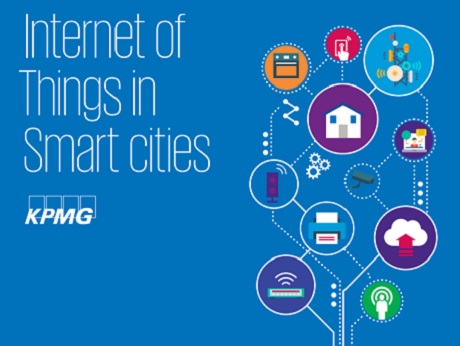
New Delhi, June 8 2019: IOT is expected to become a key factor in making a city truly smart, and more livable.
This is a key finding of a study by KPMG in association with Exhibitions India Group, in a report titled – “Internet of Things in Smart cities” . Released at the 5th Smart Cities India 2019 Expo recently, the report highlights in depth the concept of Internet of Things (IoT), while exploring its levers of growth.
It studies the business value of Internet of Things, key applications and impact on Smart Cities. Other subjects touched upon include, ‘Dimensions of Internet of Things and its Adoption in Smart Cities’, ‘Need of Internet of Things Policy Framework for Smart Cities’, and ‘Global Progress on Internet of Things Policy Framework’.
Says Elias George, Chairman - Infrastructure, Government and Healthcare, KPMG in India: “The expected widespread adoption of ‘ Internet of Things’ (IOT) will prove to be a seminal factor in improving the efficacy of urban infrastructure, as well as in improving the quality of services to the citizen, thereby enhancing the livability of a city. The induction of IOT into the urban setting is also expected to ensure more optimal management and utilisation of public resources, in addition to making city services like urban transit more customer-centric. All said and done, IOT is expected to become a key factor in making a city truly smart, and more livable.”
Key highlights from the report
1. Emerging levers driving Internet of Things in Smart cities – Mobile Internet, Artificial Intelligence, Cybersecurity, Edge computing, Predictive analysis, Cognitive computing, Digital literacy and IoT platforms
2. Impact of Internet of Things on smart cities
- Helps cities mobilise infrastructure and processes which are smart solutions in alignment with the city’s vision
- Allows a city to manage their assets and monitor city life
- Support cities measure and optimise audit and build capacity for efficient management
3. Need an Internet of Things policy framework for smart cities - The journey to a full-fledged policy needs to develop the following:
- Demonstration centres and Centres of Excellence – Need to develop and showcase industry use cases utilising various technologies for promotion of Internet of Things across various domains like connected cities, water management, environmental regulations, remote health, waste management, safety, etc.
- Capacity building and incubation centres - Incubation centres need to aid in capacity building through availability of hardware design tools, wireless development kits, application sensors, software tools, etc. allowing research funding, test labs, international collaborations, participation in international committees and events
- Human Resource development – IoT awareness and education will allow widespread utilisation and work force building
- Standards development – Framework to certify all aspects of Internet of Things will require implementation of relevant standards related to technology, processes, interoperability and services. Secondly, creation of an expert committee for development and adoption of IoT standards in the country
- Governance structure – Framework for managing and monitoring deployment, usage and legal aspects of IoT will require an Advisory Committee to ensure compliance to standards and keep pace with technological advancements and a Governance Committee to ensure legal, regulatory and trade compliances
4. The principle of 4 Cs– In order for Internet of Things to be a success in a smart city, it must adhere to the principle of 4 Cs which are:
- Creative: Be innovative to solve urban needs using state of the art technology
- Correlated: Allow to work in tandem with various city services creating a mesh of citizen needs rather than existing in silos
- Collaborative: Induce participative and equitable behaviour inculcating strong sense of ownership|
- Certified: Secure, safe usage ensuring privacy of citizens and stakeholders
5. Dimensions of Internet of Things adoption in smart cities - IoT solutions for cities must be evaluated on the following key dimensions to ensure its early and smooth adoption.
- User centric focus
- Secure and robust solutions
- Encouraging digital equity, collaboration and citizenship
- Ease of use and user experience
- Financing and value realisation